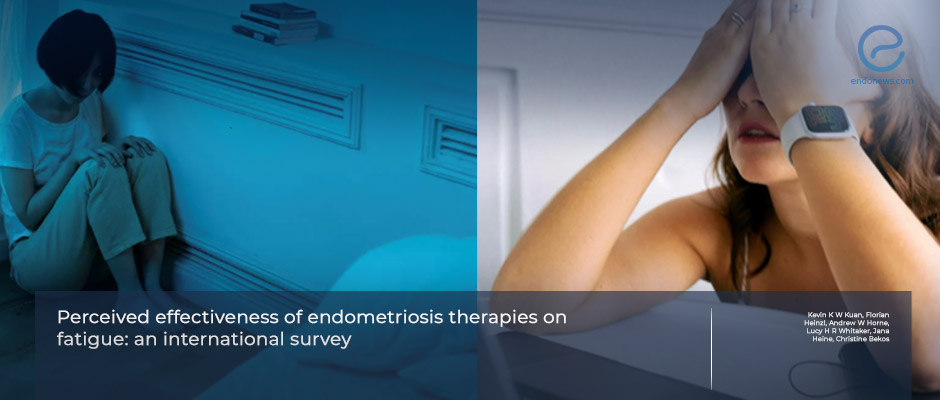Endometriosis Treatments Fall Short in Combating Fatigue
Oct 30, 2025
Fatigue Remains Untreated Despite Common Endometriosis Therapies
Key Points
Highlights:
- The majority of endometriosis management strategies, traditionally focused on pain relief, are largely perceived as having no impact on fatigue.
- Fatigue remains one of the most prevalent and debilitating symptoms, often worsening during menstruation and ovulation.
- Comprehensive strategies addressing fatigue beyond pain control are urgently needed.
Importance:
- Fatigue affects up to 87% of women with endometriosis, manifesting as persistent weariness, weakness, or loss of energy.
- It significantly reduces quality of life, impairing social, occupational, and mental well-being.
What’s done here?
- This study evaluated the perceived effectiveness of endometriosis treatments in managing fatigue through an international anonymous survey using the Qualtrics platform.
- Participants aged 16 years or older with self-reported endometriosis diagnoses provided demographic data, Brief Fatigue Inventory (BFI) scores, and perceived treatment effects over the past five years.
- The survey assessed changes in fatigue using the Patient’s Global Impression of Change (PGIC) scale.
Key results:
- Among 5,632 participants, 2,907 valid responses were analyzed.
- Fatigue levels were moderate in 78%, mild in 12%, and severe in 10% of respondents.
- Fatigue worsened during menstruation and slightly worsened during ovulation.
- Analgesics (paracetamol, NSAIDs, Celebrex) and most hormonal therapies showed no improvement in fatigue.
- GnRH agonists were uniquely linked to worsened fatigue, reported by 54% of users.
- Laparoscopic excision/ablation resulted in minimally improved fatigue, while hysterectomy and other surgeries showed no significant benefit.
- Behavioral modifications such as energy conservation, nutrition, stress, rest/activity changes were widely used but produced minimal or no change in fatigue.
Strengths and Limitations:
- This is the first international survey directly comparing fatigue outcomes across medical, surgical, and behavioral treatment modalities. Strengths are large sample size, patient involvement in questionnaire design, and global representation.
- Limitations are retrospective self-reported design, potential recall and selection bias, limited ethnic diversity, and English-only survey, which may reduce generalizability.
From the Editor-in-Chief – EndoNews
"Fatigue remains a profoundly underappreciated dimension of endometriosis, yet it can be as disabling as chronic pelvic pain. This large international survey by Kuan and colleagues adds valuable evidence that conventional pain-focused treatments—whether pharmacologic, surgical, or behavioral—do not substantially alleviate fatigue. The finding that gonadotrophin-releasing hormone agonists frequently exacerbate fatigue underscores the need for critical reassessment of their role in long-term management.
These results remind clinicians and researchers that pain control alone cannot define therapeutic success in endometriosis. Comprehensive management must integrate energy balance, sleep regulation, inflammation control, and mental health support, guided by multidisciplinary collaboration. Fatigue, as a measurable clinical outcome, should become a routine endpoint in both clinical trials and everyday practice to ensure that patient well-being is addressed in its full complexity."
Lay Summary
Fatigue is one of the most overlooked but debilitating symptoms in women with endometriosis, often impairing productivity, emotional well-being, and social life. Despite the high prevalence of endometriosis-associated fatigue and significant impact on a person's quality of life, there is limited evidence regarding its management within the current literature.
To better understand how current therapies affect this symptom, researchers conducted an international online survey involving nearly 3,000 women with endometriosis.
The study, published in Reproduction and Fertility by Kuan et al. from the University of Edinburgh, UK, and Medical University of Vienna, Austria, explored the perceived impact of pain medication, hormonal therapy, surgery, and lifestyle changes on fatigue.
According to the results, most available treatments—including hormonal contraceptives, analgesics, and behavioral strategies—had little or no effect on fatigue, while GnRH agonists were often linked to worsened symptoms. Laparoscopic surgery provided only minimal improvement for some patients.
The authors, led by Dr. Christine Bekos, emphasized that personalized endometriosis management cannot remain pain-focused alone. A more holistic approach that specifically targets fatigue and other quality-of-life symptoms is urgently needed to improve patient outcomes.
Research Source: https://pubmed.ncbi.nlm.nih.gov/40372805/
endometriosis pain fatique hormonal treatments the brief fatigue inventory gonadotrophin-releasing hormone (GnRH) agonists

